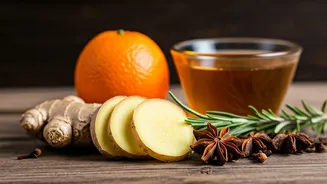The Power of Herbs
Herbs have been used for centuries to combat illnesses, and the flu is no exception. Incorporating herbs like elderberry, echinacea, and garlic can significantly
bolster your immune system. Elderberry is known for its antiviral properties, echinacea can reduce the duration and severity of flu symptoms, and garlic has potent antibacterial effects. Create herbal teas or tinctures by infusing these herbs in hot water or alcohol. This method allows you to extract the beneficial compounds, making them easier for your body to absorb and utilize in the fight against the flu. Regular consumption can offer substantial benefits.
Honey and Ginger
Honey and ginger are a dynamic duo in the realm of natural remedies. Honey, with its soothing properties, can calm a sore throat and suppress coughs, while ginger is celebrated for its anti-inflammatory effects and ability to alleviate nausea. Combine honey and ginger in a warm beverage, such as tea, for immediate relief. Grate fresh ginger into hot water and add a spoonful of honey for a comforting drink. This blend works synergistically to reduce symptoms and support overall health during a flu. It is a palatable and effective solution for many flu-related discomforts.
Citrus for Immunity
Citrus fruits, brimming with vitamin C, play a vital role in strengthening the immune system. Vitamin C helps the body produce more white blood cells, which are crucial for fighting off infections. Consume oranges, grapefruits, lemons, and limes regularly. You can enjoy them fresh, or incorporate their juices into smoothies and other dishes. Adding a squeeze of lemon to your water or enjoying a glass of orange juice can provide a daily dose of this essential nutrient. Regular intake of citrus fruits ensures your body is well-equipped to battle the flu virus.
Eucalyptus Steam
Eucalyptus is renowned for its ability to clear nasal passages and ease breathing difficulties. A eucalyptus steam treatment can bring significant relief from flu symptoms such as congestion. Add a few drops of eucalyptus essential oil to a bowl of hot water and inhale the steam. Cover your head with a towel to trap the steam and ensure maximum effectiveness. The steam helps to loosen mucus, making it easier to breathe, while the eucalyptus oil offers antiviral and anti-inflammatory benefits. This is a simple, effective method to clear congestion and ease breathing.
Hydration is Key
Staying hydrated is absolutely crucial when fighting the flu. Drinking plenty of water, herbal teas, and clear broths can help to thin mucus, prevent dehydration, and facilitate faster recovery. Dehydration can worsen flu symptoms, so it’s essential to maintain a high fluid intake. Avoid sugary drinks that can suppress the immune system. Water flushes out toxins and helps your body function at its best. Sip fluids regularly throughout the day to support your body's natural defense mechanisms and ease your discomfort during a flu episode.
Rest and Sleep
Adequate rest and sleep are non-negotiable when battling the flu. Your body needs ample time to heal and repair itself. Aim for at least 7-8 hours of sleep each night. Create a relaxing bedtime routine to help you fall asleep easily. This might include a warm bath, reading a book, or sipping a calming herbal tea. Avoid screen time before bed, as the blue light emitted from devices can interfere with sleep. Prioritizing rest allows your immune system to work efficiently and speed up your recovery from the flu.
Chicken Soup's Magic
Chicken soup isn't just a comfort food; it's a proven remedy. The warm broth helps to thin mucus, while the ingredients like chicken, vegetables, and herbs provide essential nutrients. Chicken contains amino acids that can reduce inflammation, and the vegetables offer vitamins and antioxidants. Homemade chicken soup allows you to control the ingredients and add extra immune-boosting components like garlic and ginger. Enjoying a bowl of chicken soup can soothe your symptoms, provide nutrients, and offer a sense of comfort that aids in your recovery.
Nasal Rinsing
Nasal rinsing is an effective method for clearing nasal congestion and removing irritants from the nasal passages. Using a saline solution, gently flush your sinuses with a neti pot or a similar device. This can help to relieve congestion, reduce inflammation, and alleviate sinus pressure. Nasal rinsing is a safe and natural way to manage flu symptoms related to nasal congestion. Perform the rinse once or twice a day, especially when experiencing congestion. It provides almost immediate relief by cleansing the nasal passages.
Vitamin D Intake
Vitamin D plays a critical role in immune function, and maintaining adequate levels can help ward off the flu. Sunlight is the primary source of vitamin D, so spending some time outdoors can be beneficial. Dietary sources include fatty fish like salmon, egg yolks, and fortified foods. If you're unable to get enough vitamin D through sunlight or diet, consider taking a supplement. Vitamin D enhances the function of immune cells and helps the body fight off infections. Ensure you're getting enough vitamin D to support your overall health and resistance to the flu.
Air Humidification
Using a humidifier can help alleviate the symptoms of the flu, especially those related to congestion and dry cough. Dry air can irritate the respiratory passages, making symptoms worse. A humidifier adds moisture to the air, helping to keep the nasal passages moist and reducing coughs. Clean your humidifier regularly to prevent the growth of mold and bacteria. Place the humidifier in your bedroom or living room to maximize its benefits. Humidified air can improve your comfort level and provide relief during a flu episode, facilitating a quicker recovery.













